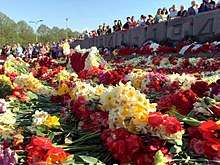Victory Memorial to Soviet Army



The Victory Memorial to Soviet Army (Latvian: Uzvaras piemineklis – 'Victory Memorial'; Russian: Памятник освободителям Риги – 'Memorial to the Liberators of Riga'), initially "Monument to the Liberators of Soviet Latvia and Riga from the German Fascist Invaders" (Latvian: Padomju Latvijas un Rīgas atbrīvotājiem no vācu fašistiskajiem iebrucējiem, Russian: Памятник освободителям Советской Латвии и Риги от немецко-фашистских захватчиков) is a memorial complex in Victory Park, Riga, Latvia erected in 1985 to commemorate the Soviet Army's victory over Nazi Germany in World War II. It was designed by sculptors Lev Bokovsky and Aivars Gulbis. The complex consists of a 79-meter tall obelisk and two groups of sculptures – Mother Motherland and a band of three soldiers.[1]
Controversy
In 1997 the monument was unsuccessfully bombed by members of Latvian ultra-nationalist group Pērkonkrusts, two of whom died during the bombing.[2] Nowadays the monument remains a controversial subject, as many ethnic Latvians regard it not only as a symbol of Soviet victory in the Second World War, but also of the Soviet re-occupation of Latvia.[3][4] The monument's obelisk is sometimes referred to as "Moscow's finger" (Maskavas pirksts).[1]
In 2007 the Popular Front of Latvia and alliance of Latvian WWII veterans sent an open letter to Prime Minister of Latvia Aigars Kalvītis urging him to prevent "any provocations that might discredit the Latvian state" and resolve any issues in regard to the moment's removal as it is "glorifying the ideals of a regime guilty of genocide that killed about 60 million people, including thousands of Latvians."[5]
In 2013 more than 11,000 signatures had been collected for an online petition to remove the monument and reconstruct Victory Square the way it was originally planned in the 1930s, before the Soviet occupation of Latvia in 1940, with the Justice Minister of Latvia Jānis Bordāns being among the supporters. Ministry of Foreign Affairs of the Russian Federation representative Alexander Lukashevich released a statement condemning the calls for monument's removal.[6][7] In 2016 the petition was rejected on the basis of a conclusion made by the Ministry of Foreign Affairs of Latvia that the monument is protected under Latvian-Russian 1994 agreement on preservation and maintenance of memorials and burial sites.[8][9]
References
- 1 2 Hoffmann, Thomas; Makarychev, Andrey, eds. (2018). "Russia's monuments policy in the Baltic States". Russia and the EU: Spaces of Interaction. Abingdon: Routledge. p. 99. ISBN 978-1-138-30379-9.
- ↑ "Latvia". AXT. 1998. Archived from the original on 2009-01-10. Retrieved 2008-06-03.
- ↑ Ochser, Tim (May 16, 2002). "Monument divides society on Victory Day". The Baltic Times. Retrieved May 14, 2013.
- ↑ "WWII Victory Day still stirs controversy in Latvia". Expatica. May 9, 2012. Retrieved May 14, 2013.
- ↑ "WWII veterans call for removal of Soviet monument in Riga". The Baltic Times. January 21, 2007. Retrieved May 14, 2013.
- ↑ "Dombrovskis, take down that monument". The Baltic Times. October 24, 2013. Retrieved June 28, 2014.
- ↑ "Victory Monument removal drive picks up pace". The Baltic Times. October 29, 2013. Retrieved June 28, 2014.
- ↑ "Victory Monument in Riga protected by agreement with Russia". The Baltic Course. June 9, 2016. Retrieved September 5, 2016.
- ↑ "Latvia Rejects Initiative to Demolish Riga Soviet Liberators Memorial". Sputnik News. June 29, 2016. Retrieved September 5, 2016.
Coordinates: 56°56′12″N 24°05′09″E / 56.936804°N 24.085808°E